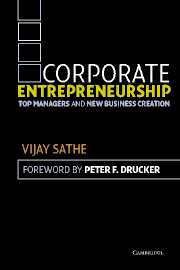Book contents
- Frontmatter
- Contents
- List of figures
- List of tables
- Foreword
- Preface
- List of abbreviations
- 1 Introduction
- 2 Why a consistent emphasis and approach for new business creation is beneficial but difficult to achieve
- I The business environment
- II The management culture
- III The corporate executives
- IV The division general manager
- V The division and its top management team
- 15 The identification and pursuit of new business opportunities
- 16 Other new business creation challenges for the division
- 17 The division's organization, competence, and collaboration for new business creation
- 18 The effectiveness of the division's top management team
- VI Putting it all together
- Notes
- Bibliography
- Index
16 - Other new business creation challenges for the division
Published online by Cambridge University Press: 22 September 2009
- Frontmatter
- Contents
- List of figures
- List of tables
- Foreword
- Preface
- List of abbreviations
- 1 Introduction
- 2 Why a consistent emphasis and approach for new business creation is beneficial but difficult to achieve
- I The business environment
- II The management culture
- III The corporate executives
- IV The division general manager
- V The division and its top management team
- 15 The identification and pursuit of new business opportunities
- 16 Other new business creation challenges for the division
- 17 The division's organization, competence, and collaboration for new business creation
- 18 The effectiveness of the division's top management team
- VI Putting it all together
- Notes
- Bibliography
- Index
Summary
This chapter examines how the way in which other challenges are managed by the division influences new business creation (Table 16.1).
Entrepreneurship is the pursuit of an opportunity because of a genuine belief in its attractiveness. It is what sustains a new initiative through the unexpected problems that are bound to occur. It is what motivates the search for creative solutions. But there is a danger that what is perceived and labeled as “entrepreneurship” is, in fact, fake. People pursue the opportunity not because of any real conviction or passion but because it is expected of them, or because others believe it is worth pursuing. Fake entrepreneurship must be recognized and avoided and real entrepreneurship detected and encouraged.
Avoiding fake entrepreneurship
The champion is not merely the principal driver of the new initiative. He is passionate about it. It is his baby. Unfortunately, there are far fewer real champions than top managers assume. What is viewed as corporate entrepreneurship is often fake. One reason for this is that many corporations do not have a gene pool of innovators, as Monsanto president Jim Reilly pointed out:
If you think about it, innovators are by nature different. In a population of 1,000 live births I would guess there probably aren't 100 that have even a shred of creativity in them. At an early age you siphon off a great many of the really creative people to the arts and other places not available to industry. And within industry you siphon off a great many to the creative production side – advertising, and so on–who in most companies do not rise to the top of the corporation. […]
- Type
- Chapter
- Information
- Corporate EntrepreneurshipTop Managers and New Business Creation, pp. 237 - 253Publisher: Cambridge University PressPrint publication year: 2003



